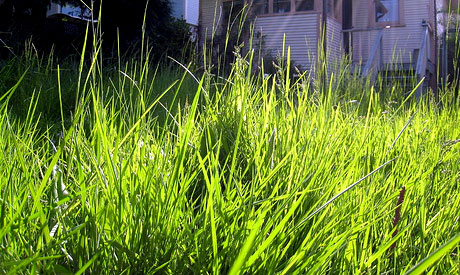
It’s very easy to get dirty when working in the yard yet what ends up on our hands and clothing isn’t true guck and grime. That’s because in reality the earth is clean and nature is constantly renewing itself as a place for life to exist.
Ironically, because of limited time but a desire to keep our properties looking somewhat respectable, we try to speed up the process that harm our environment. We use machines that run on or derivatives of fossil fuels which pollute, harsh substances that contaminate, and misuse natural resources.
In many ways what ends up happening is that we leave the ground a little worse off than when we started. That’s why there is no better time than now to make a few adjustments to our landscaping and gardening practices and bring about a greener future for our communities and the environment at large.
Consider the following three points to help achieve this goal:
Tools
The automatic tools we use in the yard like lawn mowers, weed whackers, and bush trimmers make cleaning up a lot easier but depending on their energy source can negatively impact the ecosystem around us.
How so? Take the models that use gasoline. They burn it just like vehicles driving down the street and depending how big a lawn is studies have shown the average lawnmower can create as much pollution as a car on the freeway. That means the person holding the lever is breathing in fumes until the last blade of grass is cut!
Electric power is a better option but during the summer electricity is in high demand. Additional pressure on the grid equals more pollution, especially for power plants that run on coal.
The bottom line: Whenever possible, try using manual tools. They may require a little extra effort but when juxtaposed with the effects automatic tools have on our health and environment they are worth a few extra minutes outdoors.
Chemicals
Pesticides are a common problematic chemical used on a homeowner’s property. When they are sprayed on plants producing food they can be absorbed by fruits and vegetables and scrubbing and washing won’t remove what's under the skin. Also, pesticides not only kill pests but beneficial insects as well which means they can drastically affect the local ecosystem.
A second category of chemicals is weed killers, which don’t always discriminate between weeds and desirable plants. They can make pets and wildlife very sick and potentially contaminate soil by tainting aquifers when absorbed into the ground.
Exposure to both weed killers and pesticides are believed to cause uncomfortable symptoms in people like itchy eyes and dizziness and repeated contact with these substances may result in serious long term health problems.
The bottom line: There are many natural methods for warding off pests and killing weeds including store bought products and solutions made from household staples. Make one of these your preferred choice for striking back at pests or unwanted vegetation. Also, keeping plants healthy can control weeds and avert disease.
Resources
A third point for greening yard work involves focusing on resources. On the one hand resources need to be used wisely, such as water, which should be distributed near a plant’s roots. When water it poured on leaves or sprayed with a garden hose it creates a lot of waste.
Another consideration about water usage is the types of plants in the yard including the lawn and how needy they are as some species require less water than others.
Meanwhile, resources aren’t just about keeping certain things in check but also checking what’s available for improving overall efficiency. For example, it’s very easy to go to a home improvement store to buy fertilizer, mulch, and other landscaping and gardening products but usually unnecessary.
Depending on your surroundings many of these items can be made on site. Food scraps can be composted and clippings and trimmings can be turned into mulch. Doing so is simply another form of using and reusing that makes the world a better place.
Jakob Barry is a home improvement journalist for Networx.com. He blogs about Green topics for professionals across the U.S. like fencing contractors in Scottsdale, AZ.
Photo Credit: Kables




